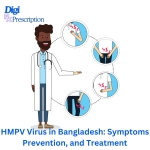
HMPV Virus in Bangladesh: Symptoms, Prevention, and Treatment
Human Metapneumovirus (HMPV) is a respiratory virus that affects people of all ages, particularly children, the elderly, and individuals with weakened immune systems. With the onset of winter, respiratory infections become more common in Bangladesh, making it essential to understand the symptoms, preventive measures, and treatment options for HMPV.
What is HMPV?
HMPV, or Human Metapneumovirus, is a contagious respiratory virus that causes cold-like symptoms. First identified in 2001, the virus is now recognized as one of the leading causes of respiratory illnesses worldwide. It is particularly prevalent during the colder months and spreads through respiratory droplets, direct contact, and contaminated surfaces.
Symptoms of HMPV
HMPV symptoms can range from mild to severe, depending on the individual’s age and health condition. Common symptoms include:
- Runny or Stuffy Nose
- Cough
- Sore Throat
- Fever and Chills
- Wheezing
- Shortness of Breath
- Fatigue or Weakness
In severe cases, particularly among high-risk groups, HMPV can lead to complications such as:
- Bronchitis
- Pneumonia
- Severe breathing difficulties
If symptoms persist or worsen, seek medical attention immediately.
How HMPV Spreads
The virus spreads through:
- Respiratory Droplets: From coughing or sneezing by an infected individual.
- Close Contact: With an infected person, such as handshakes or hugs.
- Contaminated Surfaces: Touching a surface with the virus and then touching your face.
Prevention Tips for HMPV in Bangladesh
1. Practice Good Hygiene
- Wash Hands Frequently: Use soap and water or an alcohol-based hand sanitizer.
- Avoid Touching Your Face: This prevents the virus from entering your system.
- Disinfect Surfaces: Regularly clean high-touch surfaces like door handles, mobile phones, and keyboards.
2. Wear a Mask
Masks help reduce exposure to respiratory droplets, especially in crowded places like markets or public transport.
3. Maintain Social Distance
Avoid close contact with people who show symptoms of illness, such as coughing or sneezing.
4. Strengthen Your Immune System
- Eat a Balanced Diet: Include fruits, vegetables, and foods rich in Vitamin C and Zinc.
- Stay Hydrated: Drink plenty of fluids to keep your respiratory system healthy.
- Sleep Well: Rest helps your immune system function optimally.
5. Stay Informed About Vaccination
While there is no specific vaccine for HMPV yet, staying updated on vaccines for similar illnesses (e.g., flu or COVID-19) can provide partial protection.
Treatment Options for HMPV
There is currently no specific antiviral treatment for HMPV. However, supportive care can help alleviate symptoms and promote recovery:
1. Over-the-Counter Medications
- Fever Reducers: Paracetamol or ibuprofen for fever and body aches.
- Decongestants: To relieve nasal congestion.
2. Home Remedies
- Steam Inhalation: Helps clear nasal passages.
- Warm Fluids: Drinking warm water, soups, or herbal teas can soothe the throat.
3. Medical Care
- Consult a doctor if symptoms worsen or if you experience difficulty breathing.
- High-risk individuals, such as infants, elderly, and those with chronic illnesses, may require hospitalization for oxygen therapy or other interventions.
HMPV in Bangladesh: Challenges and Awareness
In Bangladesh, the lack of widespread awareness about HMPV poses challenges in early diagnosis and prevention. Increased public health campaigns and telemedicine services can play a crucial role in managing this virus.
Conclusion
HMPV is a significant public health concern, especially during the winter months in Bangladesh. By understanding the symptoms, prevention methods, and treatment options, individuals can protect themselves and their families. Regular handwashing, wearing masks, and seeking timely medical advice are critical steps in combating this respiratory virus.
Reliable Sources of Information on HMPV
Local Resources
- Directorate General of Health Services (DGHS), Bangladesh: Visit Website
- icddr,b (International Centre for Diarrhoeal Disease Research, Bangladesh): Visit Website
Global Resources
- World Health Organization (WHO): Visit WHO
- Centers for Disease Control and Prevention (CDC): Visit CDC
